
It’s a no-brainer that sleep is vital for one’s health. That is why so many researchers study the best way to get good quality shut-eye. However, forget chamomile tea and meditating before bed. According to new research, women sleep better next to dogs. That’s right; Canisius College in New York State conducted a study that found that canines make better-sleeping partners than humans or cats.
“We found that women commonly rate dogs as better bed partners than cats and human partners and report that their dogs enhance their sleep quality,” Christy Hoffman, Ph.D., animal behaviorist and lead researcher of the study.
Research Finds that Women Sleep Better Next to Dogs
Hoffman surveyed almost one thousand women living in the United States to come to these findings. The results showed that 55% of the participants shared their bed with at least one dog and 31% with at least one cat. Also, 57% of these women shared a bed with a human partner, while the rest did not. [1]
Hoffman also discovered why dogs seemed to make the best bed companions. The first reason is that dogs’ sleeping patterns, as opposed to cats, more closely resemble those of humans.
“The difference between dogs and cats is not surprising because dogs’ major sleep periods tend to coincide more closely with humans’ than do cats,’” said Hoffman.
However, while there may be benefits of these similar sleeping patterns, more research is needed to know for certain. But Hoffman has some ideas of how this could work.
“In comparison to human bed partners, dogs may be better at accommodating their human’s sleep schedule,” she said. “It’s not uncommon for human bed partners to go to bed at very different times and wake up at very different times. Such differences in partners’ schedules can certainly disrupt sleep. It may be that dog bed partners adapt more readily to their owner’s schedule than do human bed partners.”
Moreover, dogs require certain schedules and responsibilities, such as a morning walk. This kind of regime helps their owners maintain a routine, improving sleep quality as a result.
Stillness and Security
Additionally, dogs tend to stay stiff as they sleep. Anyone who’s slept with a fidgety partner knows how disruptive they could be. However, women in the study reported that their dogs stayed on the bed most of the night instead of felines, who tended to come and go.
“This suggests that cats may be more likely than dogs to create disruptions by moving on and off the bed during the night. In addition, we found that dog owners kept to more consistent bedtime and wake time schedules than cat owners and also tended to go to bed earlier and wake up earlier than cat owners,” Hoffman said.
Here’s the third and most important reason: Canines provide a sense of security to their owners. More so than with cats or even human partners.
“Some dog owners may take comfort in the thought that their dog will alert them in the case of an intruder or other type of emergency; furthermore, a dog’s bark may deter a potential intruder. A cat is less likely to take on this role, and so, may not provide psychological comfort in the same way a dog might,” said Hoffman.
The Best Partner for Quality Sleep
However, while the study suggests that dogs are the perfect slumber buddies, their benefits are subjective to each case. For example, a dog could snore or make the bed too hot. Additionally, there are many owners who find that their cats help them sleep.
Keep in mind that the research was based on how the volunteers perceive their pets’ effects on their sleeping quality and duration. As a result, more objective research is needed to definitively consider dogs the superior sleeping partners. However, Hoffman believes that these studies could be beneficial as many American households have pets.
“It will be valuable to continue this line of research so we can develop a clearer picture of the contexts under which pets and their presence in their owner’s bed may positively impact sleep quality, and the contexts under which co-sleeping with a pet may be detrimental to one’s sleep quality,” she said.
For instance, research has also shown that women sleep better while alone than with a human, but many believe in the opposite. Future research could use Fitbit-like devices to objectively track the sleep quality of people in different sleeping conditions.
My Brother Makes Our Grandma Do Everything around the House — When I Saw Her Washing the Floors I Taught Him a Lesson

My Brother Makes Our Grandma Do Everything around the House — When I Saw Her Washing the Floors I Taught Him a Lesson
When Mike’s careless attitude toward his elderly grandmother reaches a boiling point, his sister devises a cunning plan to teach him a lesson. What starts as a simple party quickly unravels, exposing family tensions and leaving Mike humiliated in front of friends and family.
Hi! My name’s Mia, and here’s my story. My grandma moved into my brother’s house a few months ago after hers was sold. She needed money for medical bills, and living with him seemed like a great idea. She never complained about it, and I thought they were having a great time until I came to visit…

Mia cooks as her grandmother does the dishes | Source: Midjourney
During my first week there, I saw my grandma cook, clean, do laundry, and tend to the yard day after day. Not once did my brother lift a finger to help. Despite Granny’s back problems, he told her to do more and more with this bored, entitled tone.
“Granny, can you iron my shirts?” he would call out from the living room.
“Sure, dear,” she would reply, forcing a smile.
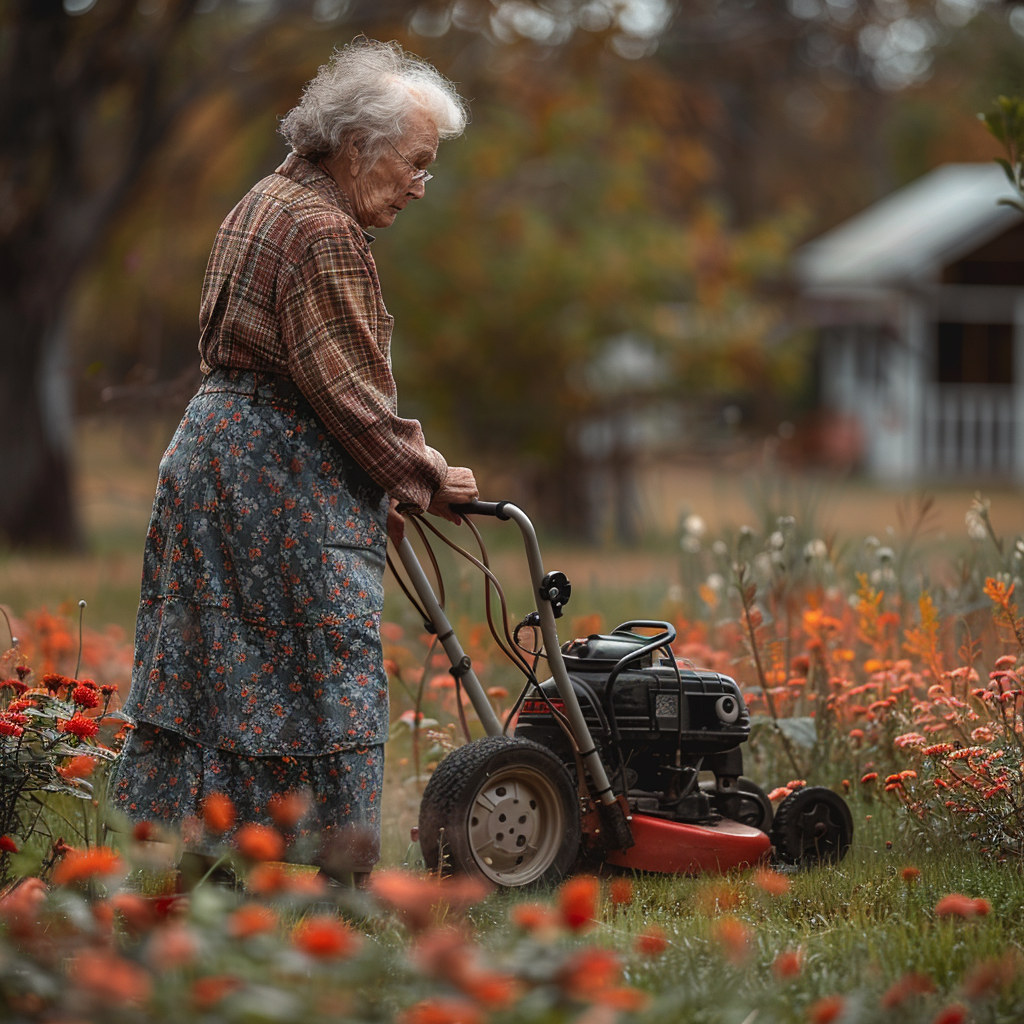
Grandmother mowes the lawn | Source: Midjourney
“Granny, the yard needs mowing,” he would say while playing video games.
“Of course, I’ll get to it,” she would answer, wincing as she stood up.
One afternoon, I found her mopping the floors. Her hands were red and dry, with knuckles sticking through pale skin. She moved slowly, pain evident in every step. That’s when I broke down and decided I couldn’t stay quiet any longer.
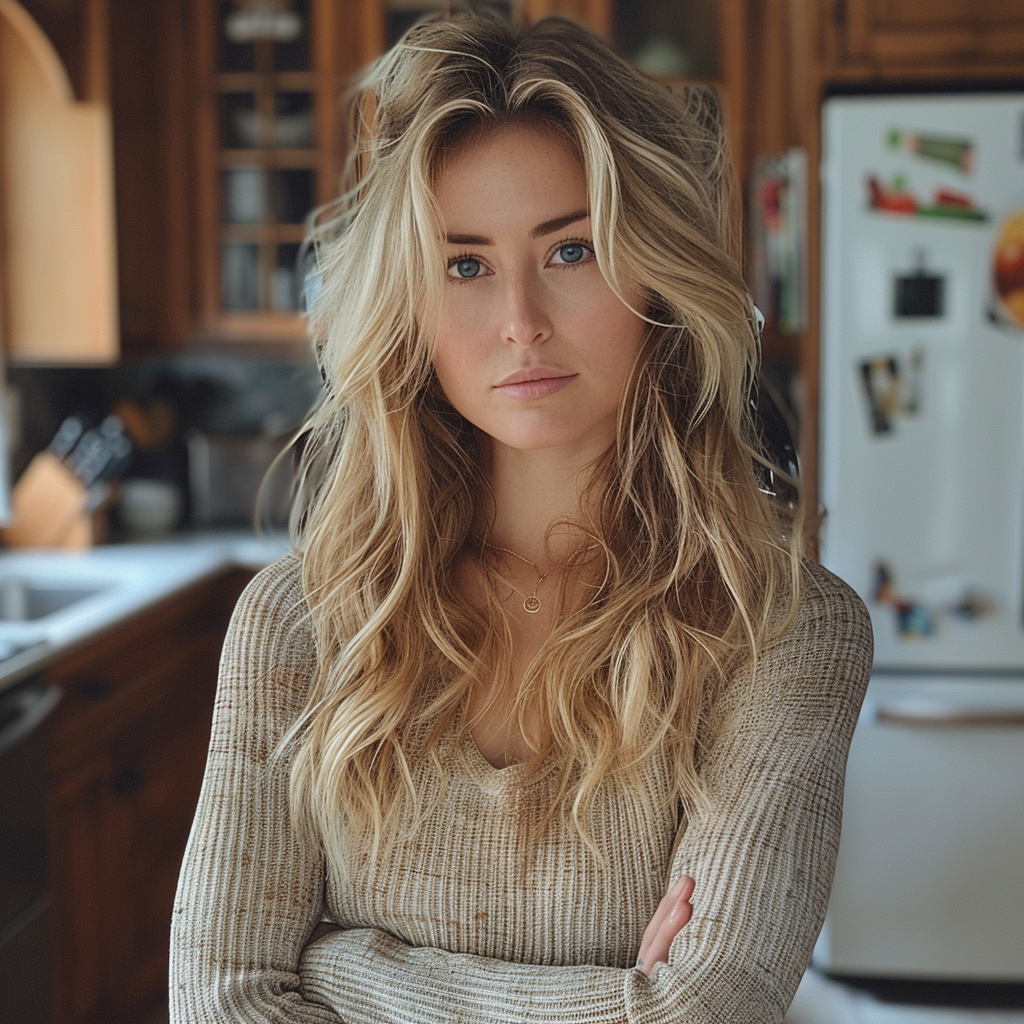
Mia confronts her grandma | Source: Midjourney
“Grandma, why are you doing all this?” I asked, my voice trembling with anger. “You should be resting!”
She looked up, tired eyes meeting mine. “He needs help, dear. He’s busy with work.”
“Busy?!” I exploded. “He’s playing video games all day! This is not fair!”
Grandma sighed. “I don’t mind. It’s just a little work.”
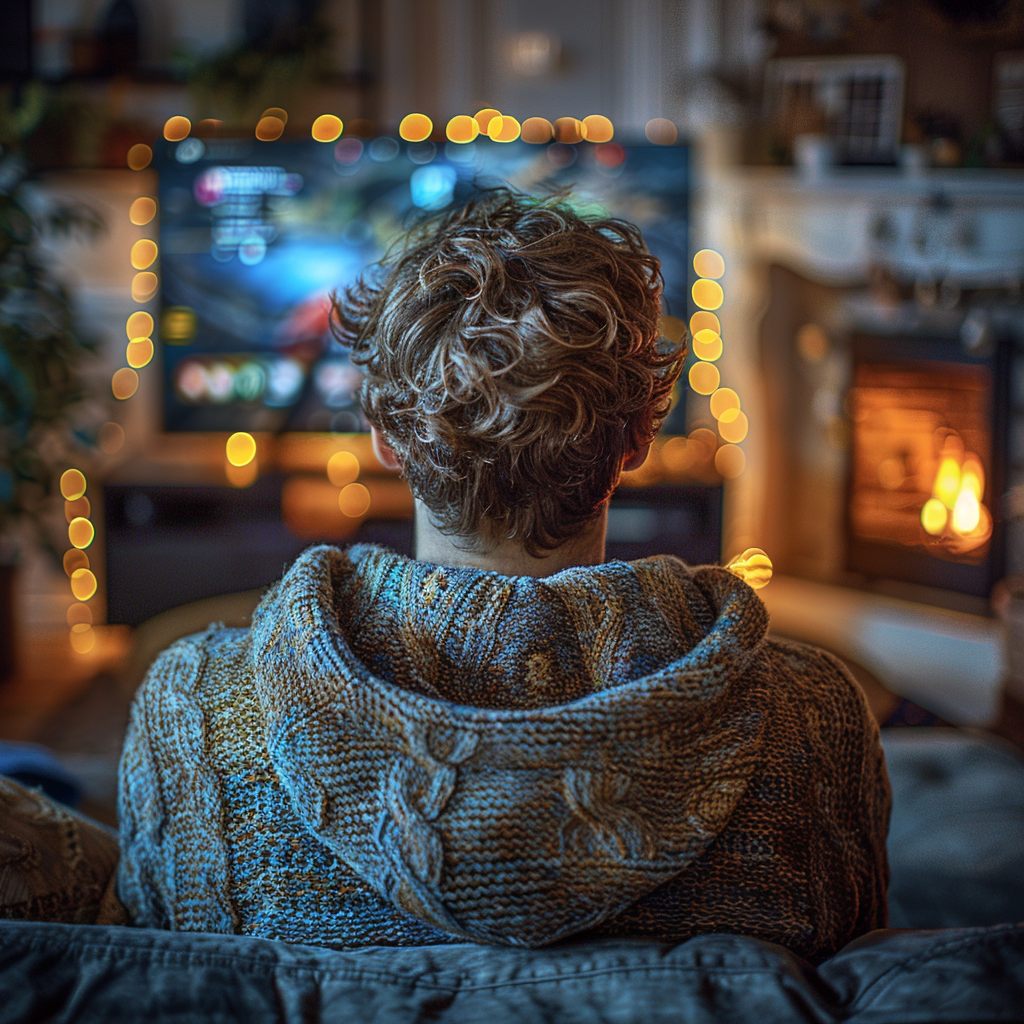
Mike plays video games | Source: Midjourney
But it wasn’t just a little work. It was too much for anyone, let alone an elderly woman with health issues. I knew I had to do something. I decided to organize a party, but not just any party. This would be a party with a twist.
The relationship between my brother and me had always been complicated. Growing up, Mike was the golden child, the one who could do no wrong.

Mike as a child | Source: Midjourney
He was a star athlete in high school, always surrounded by friends and admiration. I, on the other hand, was the quiet, bookish one. I didn’t mind staying out of the spotlight, but it did create a rift between us.
Our parents adored Mike and doted on him, often overlooking his flaws. They saw him as ambitious and driven, while I was seen as the responsible one.
I expected him to help out more around the house. This dynamic followed us into adulthood. When Grandma moved in, I hoped Mike would finally step up and take responsibility.

Mike laughs it off | Source: Midjourney
“Mike, can you at least help Grandma with the groceries?” I had asked one day when I called to check in.
He had laughed. “She’s fine, sis. She likes to stay busy.”
“She’s not a maid,” I had snapped back, frustration boiling over.
“Don’t be so dramatic,” he had replied dismissively.
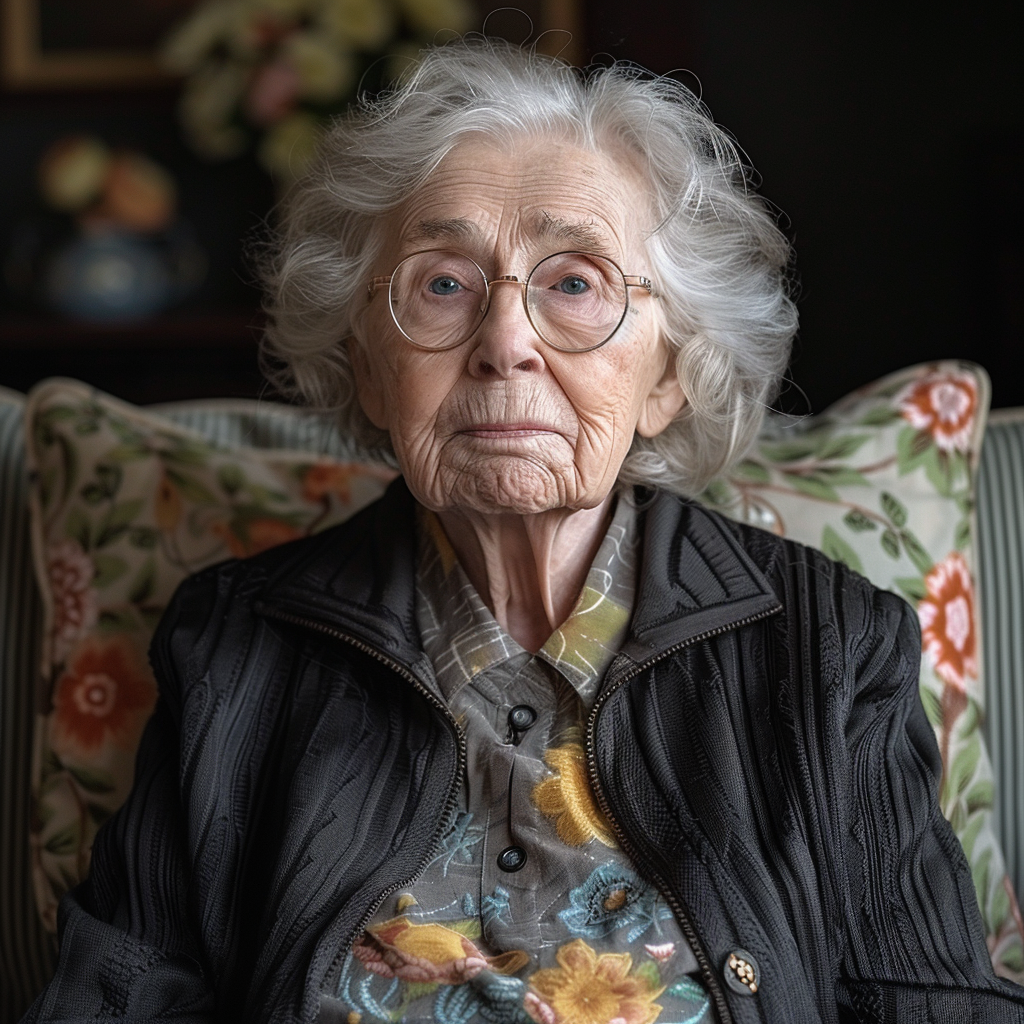
The struggling grandma | Source: Midjourney
Seeing Grandma now, struggling and in pain, I felt a mix of anger and sadness. Mike had always been self-centered, but this was a new low. I couldn’t stand by and watch any longer.
One evening, I sat down with Grandma after dinner. “Granny, you need to rest. You can’t keep doing all this.”
She patted my hand. “I’ll be fine, sweetie. I’ve handled worse.”
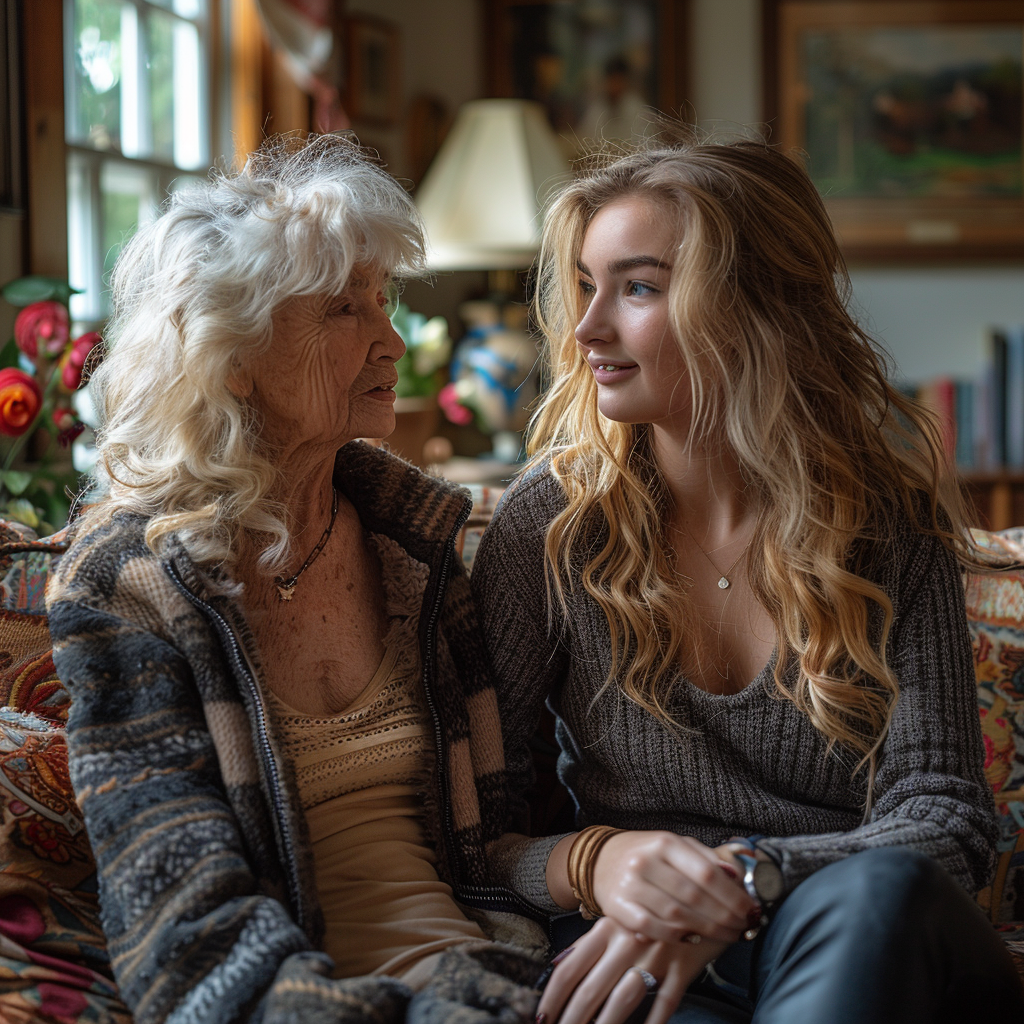
Mia talks to her grandma | Source: Midjourney
“But you shouldn’t have to,” I insisted. “Mike needs to learn to help out. This isn’t fair to you.”
She sighed, looking weary. “He’s just used to it. He’s always been like this.”
I shook my head. “That doesn’t make it right.”
As I thought about what to do, an idea formed in my mind. It was bold, maybe even a bit risky, but I knew it had to be done. Mike needed a wake-up call, and I was just the person to give it to him. He couldn’t keep getting away with treating Grandma like this. It was time for a change.

Mia has an idea | Source: Midjourney
The plan started to take shape in my mind. I would organize a surprise for Mike, something that would make him see just how much work Grandma was doing. He needed to understand the weight of responsibility and the value of family. And I was determined to make sure he learned his lesson.
On her last day of staying there, I asked my brother Mike for a small party. He agreed, thinking it would be a good way to see old friends.
The party was planned for the evening before I left. Our high school friends, his football team, and even some nostalgic teachers were invited for a BBQ and a celebration.

Party invitation | Source: Midjourney
As the time when everyone was supposed to arrive approached, I got busy with my plan. I yanked all of Mike’s clothes into the laundry bin and dirtied them with ketchup and dirt. He wouldn’t have anything clean to wear.
Next, I put clean dishes in the sink and covered them with soap and ketchup. I made sure to mess up everything Grandma had been doing for him all this time.
Mike was lounging on the couch, oblivious. “Hey, sis, can you get me a beer?” he called out.

Mia dirties the dishes | Source: Midjourney
I rolled my eyes. “Sure, Mike,” I said sweetly. I handed him the beer, knowing chaos was about to unfold.
As the first guests started to arrive, Mike finally noticed the mess. “What the heck happened here?” he muttered, looking around the kitchen. “Grandma, did you forget to clean up?”
Grandma, who was resting in the living room, looked confused. “I’m sorry, dear. I must have missed it.”

Mike sees his dirty laundry | Source: Midjourney
Mike huffed and went to the laundry room. He opened the bin and saw his clothes stained and dirty. “Seriously?” he grumbled. “I have nothing to wear!”
He stormed back into the kitchen, where I was setting out snacks. “What’s going on, sis? Why is everything a mess?” he demanded.
I shrugged. “I don’t know, Mike. Maybe you should ask Grandma.”

Mike tries to tidy up his house | Source: Midjourney
He groaned and grabbed a dirty shirt from the bin, reluctantly putting it on. Guests started coming in, and Mike was running around in his stained clothes, trying to clean up.
“Ugh, my grandma was supposed to clean this already,” he muttered to his friend, Tom. “Because of her, I have nothing to wear!”
Tom raised an eyebrow. “Dude, you’re thirty. Are you serious?” he asked, laughing.

High school friends laughing at Mike | Source: Midjourney
Another friend, Jake, smirked. “Yeah, man. Do your own laundry. What’s wrong with you?”
Mike ignored them and kept trying to clean up. Grandma, despite her exhaustion, got up to help him. “I’m sorry, Mike. I can help now,” she said, grabbing a mop.
“You should have done this earlier, Grandma. Now everything’s ruined.”
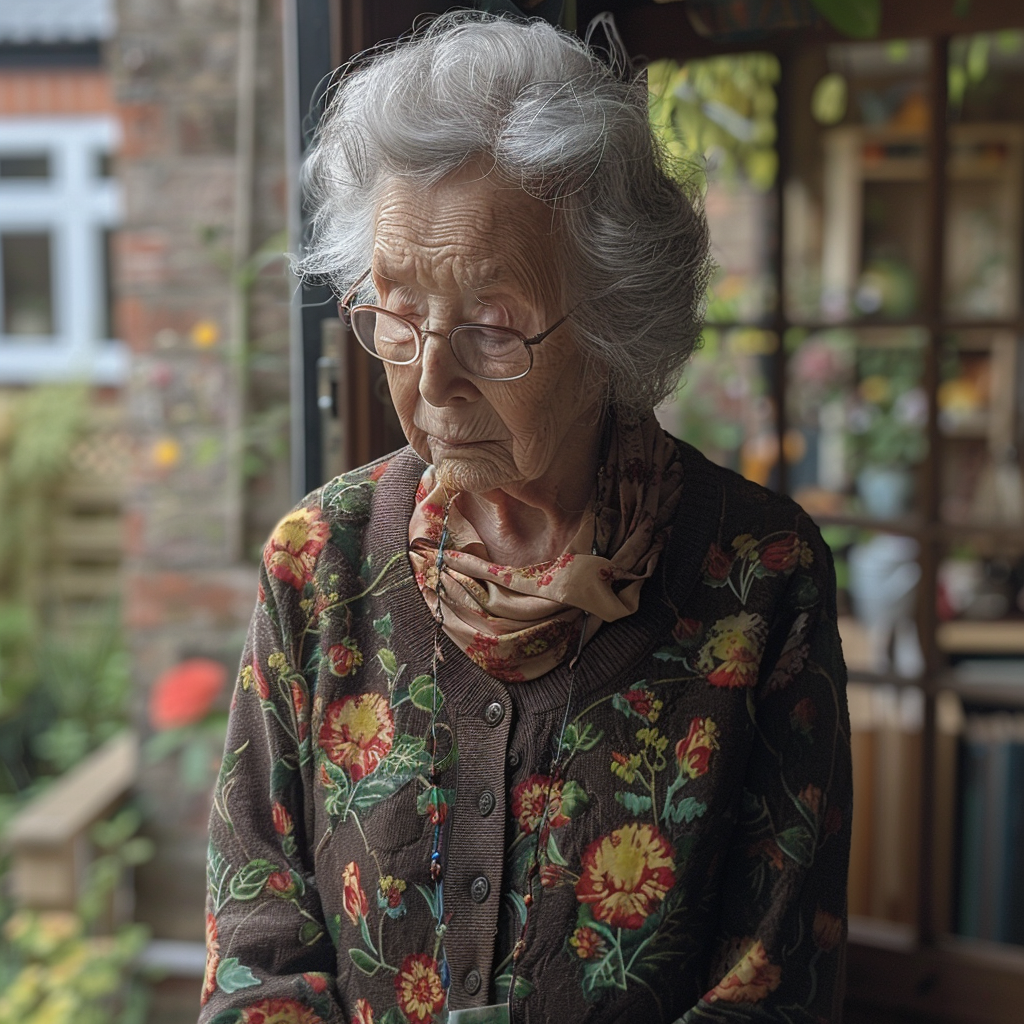
Sad grandmother looks down | Source: Midjourney
The room fell silent as everyone watched the scene unfold. Mike’s angry speech echoed in the quiet house. “Why can’t you just do your job, Grandma?” he shouted.
People looked at him in disbelief. One of the old teachers, Mr. Parker, shook his head. “Mike, you should be ashamed. She’s your grandmother, not your maid.”
Mike’s face turned red. He looked around at the judgmental faces of his friends and family. Humiliated, he stomped upstairs and locked himself in his room.

Mad Mike | Source: Midjourney
I turned to Grandma, who looked upset. “Don’t worry, Grandma. Let’s enjoy the night,” I said, giving her a hug.
The guests slowly resumed their conversations, the awkwardness fading away. We enjoyed the BBQ, shared stories, and had a good time. Grandma finally relaxed and laughed with her old friends.

Family enjoying a barbecue | Source: Pexels
As the evening went on, I felt a sense of satisfaction. Mike needed to understand what Grandma had been going through. Hopefully, this would be a wake-up call for him to change his ways.
Grandma smiled at me. “Thank you, dear,” she said softly. “I hope he learns from this.”
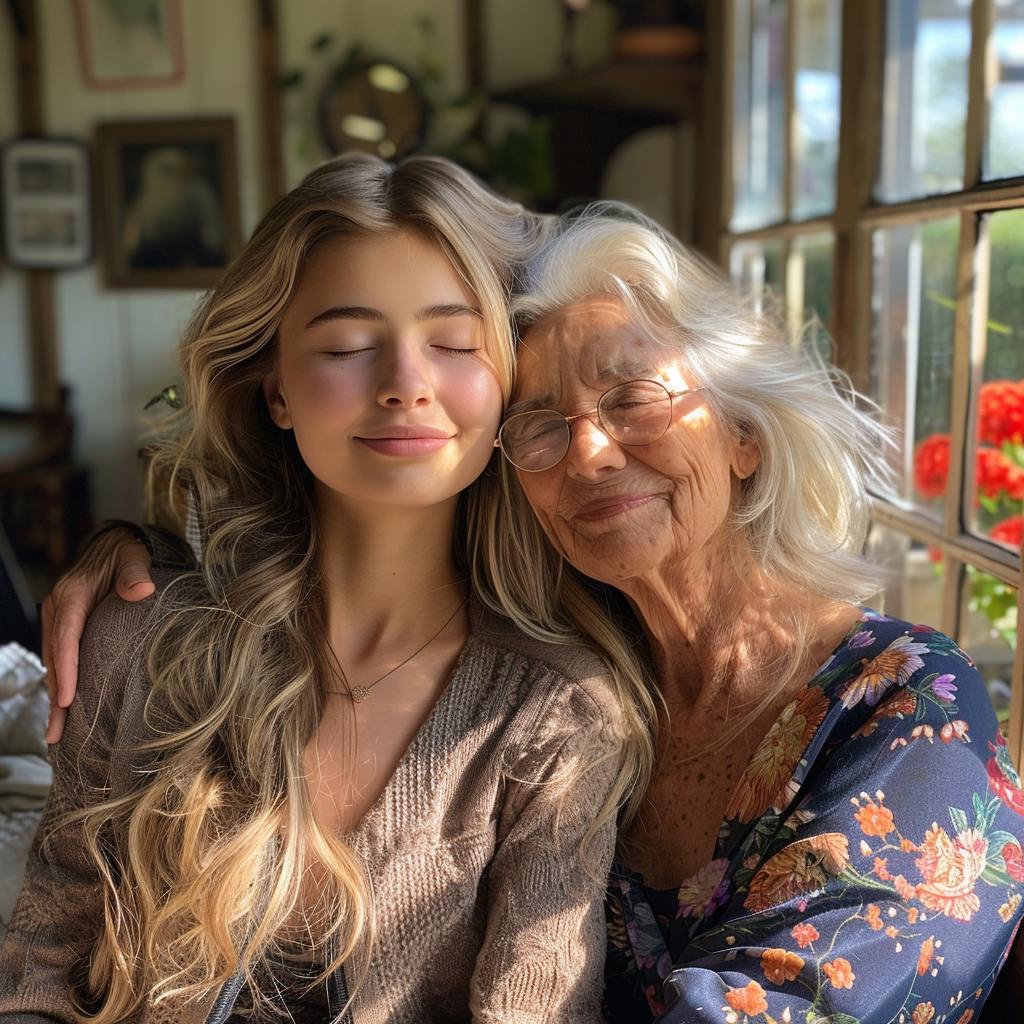
Mia hugs her grandmother | Source: Midjourney
“I think he will,” I replied, looking up at the darkened window where Mike had retreated. “He has to.”

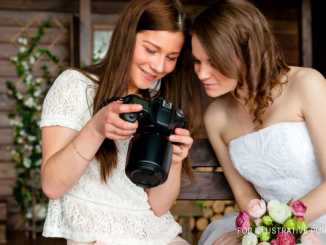

Leave a Reply